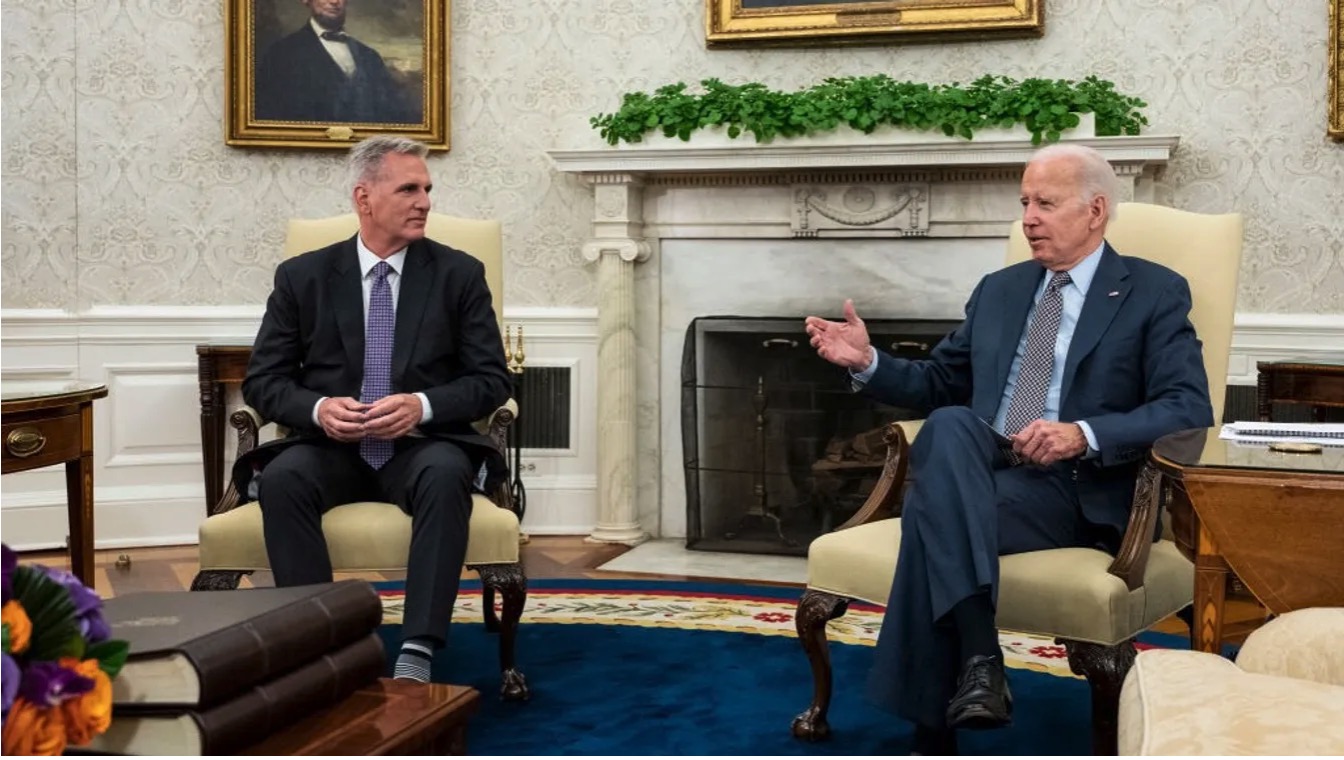Comments
GUEST COMMENTARY - When Congress passed the debt ceiling deal hammered out by President Joe Biden and House Majority Leader Kevin McCarthy, centrist media celebrated.
If we had anything like a responsible White House press corps, we never would have gotten to this point. Treating the Republican gambit—demanding deeply unpopular policy measures in exchange for allowing the government to pay off debts Congress had already authorized—as anything other than economic hostage-taking gave it the legitimacy the party needed to stick with it without fear of massive political blowback (CounterSpin, 5/5/23).
Instead, the press corps we have gave three cheers for bipartisanship.
‘Complaints on either side’
NPR‘s Domenico Montanaro (6/1/23) hailed the compromise in a piece headlined, “Don’t Believe the Hype: Low-Key Lawmakers Helped Avert a Debt Ceiling Crisis.” A paean to “pragmatists,” the article argued that
it will be those who eschewed the wings of their parties—which have some of the most vocal, attention-getting members—who averted a potentially calamitous, first-ever US debt default.
Call them perhaps the Silent Middle Majority.
Montanaro offered a both-sides framing of the deal:
There were plenty of well-founded complaints on either side—on the left, worries about increased work requirements that could hurt people in poverty, nervousness about the environmental impact of sped-up energy permits; on the right, continued head-shaking about what they see as out-of-control spending and debt, now topping $30 trillion.
But in the end, two-thirds of House Republicans and more than three-quarters of Democrats voted for the bill for a total tally of 314–117.
It’s an analysis that simply assumes the validity of the premise that some sort of deal needed to be worked out to begin with: If a hostage-taker complains that their demands have only partially been met, how well-founded is that complaint?
And on top of the false premise, Montanaro has to stretch to make both sides’ “complaints” seem at all comparable, matching the left’s “worries” and “nervousness”—about harming people and the environment—to the right’s “what they see as” problems. But there’s solid research behind the “worry” that work requirements exacerbate hardship (CBPP, 3/15/23), and speeding up energy permits is intended to increase fossil fuel production (American Prospect, 6/2/23), which is precisely what must be halted to stave off the worst of climate change outcomes.
And however much right-wing politicians shake their heads about the debt, it’s journalists’ duty to point out the disingenuousness of a party that runs up debt via tax cuts, and then pretends to favor fiscal responsibility when it comes time to pay the bills (FAIR.org, 1/25/21).
‘Far-right and hard-left…in revolt’
The New York Times also luxuriated in the outpouring of bipartisanship, with chief White House correspondent Peter Baker (5/28/23) reporting that Republicans’ success in holding the economy hostage “bolsters President Biden’s argument that he is the one figure who can still do bipartisanship in a profoundly partisan era.” He added, though, that the deal “comes at the cost of rankling many in his own party who have little appetite for meeting Republicans in the middle.”
Another piece, by congressional reporter Catie Edmondson (5/31/23), presented the deal as “a broad bipartisan coalition” in support of “a critical vote to pull the nation back from the brink of economic catastrophe”:
With both far-right and hard-left lawmakers in revolt over the deal, it fell to a bipartisan coalition powered by Democrats to push the bill over the finish line, throwing their support behind the compromise in an effort to break the fiscal stalemate that had gripped Washington for weeks.
When the Times reports that the “far right” and “hard left” both oppose something, that’s a sure sign that the paper thinks it’s a good thing. Another front-page piece in the paper, by Jim Tankersley (5/29/23), went out of its way to argue that not only was it good that the White House made a deal, but that, all in all, it was a good deal:
Economists say the agreement is unlikely to inflict the sort of lasting damage to the recovery that was caused by the 2011 debt ceiling deal—and, paradoxically, the newfound spending restraint might even help it.
“The economy could actually use a mild dose of fiscal austerity right now,” Tankersley reported economists were saying; the cuts will throw people out of work, so the Federal Reserve won’t have to. In the 23rd of 25 paragraphs, after presenting the Republican argument that the deal “will help the economy by reducing the accumulation of debt,” the reporter acknowledged that the cuts “will affect nondefense discretionary programs, like Head Start preschool, and…new work requirements could choke off food and other assistance to vulnerable Americans.”
‘Centrists’ vs. ‘fringes’
The Washington Post (5/30/23) seemed practically giddy at the deal: “A Washington Surprise: Centrists Push Back Against Fringes in Debt Deal.”
In the piece, White House bureau chief Toluse Olorunnipa found a way to equate Republicans willing to blow up the economy if they weren’t given policy concessions—ones they didn’t think they could achieve through legislation—with Democrats who insisted that government debts simply had to be paid:
For weeks, conservative Republicans warned House Speaker Kevin McCarthy not to back down from sweeping spending cuts, saying anything else would be an unforgivable betrayal. Liberals implored President Biden to abandon the debt ceiling talks altogether, insisting the Constitution enabled him to simply ignore Republican demands.
But in the end, the two leaders opted for a middle-of-the-road settlement, aiming to coalesce center-right and center-left lawmakers around the idea that an imperfect deal was preferable to a historic default that could devastate the economy. It was the first significant test for the Biden/McCarthy era of divided government, and if a theme emerged, it was the unmistakable reassertion of the political center.
“Both sides were initially sounding very ardent about an inflexible position,” said presidential historian Douglas Brinkley. “Yet both sides ultimately blinked—and that is what American politics is all about.”
Winners and losers
In all of the coverage, one consistent theme was the compulsion to declare winners and losers. Some outlets picked one side or the other: “House Passes Debt Ceiling Bill in Big Win for McCarthy,” judged the Hill (5/31/23), and USA Today (6/2/23) similarly had “McCarthy Gets Win Passing Debt Deal.” “Apostle of Bipartisanship: Why US Debt Ceiling Deal Was a Victory for Joe Biden,” explained the British Guardian (6/1/23), while the Washington Post (6/1/23) had a more confusing “Biden Won on the Debt Ceiling. Why Doesn’t He Want It to Look That Way?”
Others declared both dealmakers victorious. Politico‘s popular Playbook newsletter (6/1/23) ran with “How McCarthy and Biden Both Won the Debt Deal.” The Washington Post (6/1/23) simply offered the two sides’ own declarations: “Sidestepping Crisis, Biden and McCarthy Claim Victory in Debt Deal.” Another USA Today piece (6/1/23) made the bold claim, “Debt Ceiling Plan Passes Senate. Who Wins? Everyone, and Here’s Why.”
In a different twist, CNN (5/30/23) offered its perspective on which companies were “winners” in the deal—leading off with Equitrans Midstream, the lead developer of the Mountain Valley Pipeline project that Sen. Joe Manchin forced into the agreement.
It also included lending company SoFi, which would profit from an end to the student loan repayment freeze included in the deal, and H&R Block and TurboTax, which are expected to benefit from the deal’s cuts to the IRS. This curtailment will likely stymie the agency’s plan to develop a free electronic tax filing system, which would have rendered those tax preparers’ offerings much less profitable.
CNN‘s “winners” begin to suggest who some of the “losers” are in this deal. It preserves tax cuts for the wealthy and funding for the Pentagon, while cutting the rest of discretionary funding, forcing more work requirements on recipients of public assistance, fast-tracking fossil fuel projects and weakening environmental protections—all great for corporations and wealthy political donors, and terrible for most people. But both major parties agreed to inflict this damage—and that in itself makes it good news for establishment media.
(Julie Hollar is FAIR's senior analyst and managing editor. Julie has a Ph.D. in Political Science from the Graduate Center of the City University of New York.)
(Jim Naureckas is editor of FAIR (Fairness & Accuracy In Reporting). He is the co-author of "Way Things Aren't: Rush Limbaugh's Reign of Error." He was an investigative reporter for In These Times and managing editor of the Washington Report on the Hemisphere. This article was featured in CommonDreams.org.)














